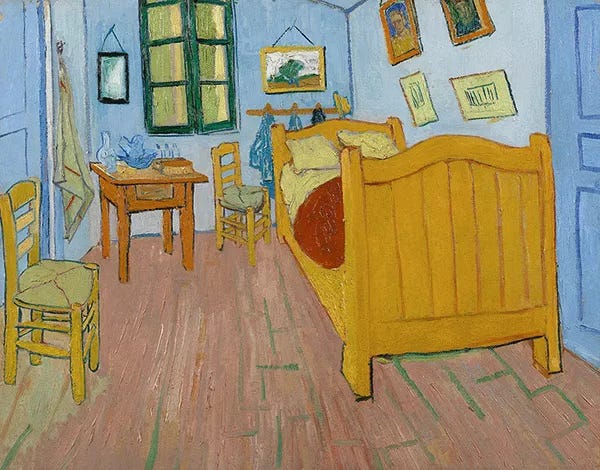I’ve always had strict rules for buying second-hand furniture. Only buy things that you can’t sleep on and that are easy to clean. This immediately rules out mattresses and couches and anything upholstered.
But once, when I was in the throes of med school, I caved.1 I bought a leather couch off Craigslist. It was small enough to get it up to my 3rd floor walk-up. It was one of those last minute deals — for $100.
I rationalized it to myself: leather is easy to clean, and it was temporary. It was just a placeholder couch. But I ended up keeping the couch until I graduated.
I’ve been thinking about the placeholders we let into our life and how long we let them stay. A placeholder is a “person or thing that occupies the position or place of another person or thing.” By nature, placeholders are meant to be temporary.
Sometimes placeholders arise from external limits (e.g. you can't get something).2 Other times, they’re driven by our internal feelings and motivations (whether we’re aware or not). I find this latter category far more captivating to dissect.
And my theory is that these kinds of placeholders fall into 3 categories:
Placeholders of exploration
“Placeholders of exploration” are bridges between curiosity and commitment. They let you feel out new interests, jobs, even identities & lifestyles. They let you experiment with unique paths before having to commit to one. People often explore new kinds of work by taking short-term contracts or apprenticeships. I could even redefine “sabbatical” as a placeholder of exploration.
Placeholders of convenience
“Placeholders of convenience” tend to be the shortcuts and side streets of our daily lives. They're convenient stand-ins. They offer utility and are cost-effective. (This could be in time, money, or some other measure.) They’re the path of least resistance and might even be sound choices for now, yet can divert you from long-term ideals. Getting takeout instead of cooking is one. Accepting a job you don't like just for the salary is another. Or, snagging that $100 second-hand couch.
Placeholders of avoidance
“Placeholders of avoidance” are things that serve as emotional bunkers. They are the people and things we cling to. We cling to them to shield ourselves from facing deeper fears, decisions, and changes. (And often we cling to something intangible too — a belief, an identity.) They may not have started out as these, but somewhere along the way they turned into them. They became barriers to your progress and growth. A classic example is a “safe” career or relationship.3
I think of these placeholders as existing on a spectrum — from proactive and intentional on one end to reactive and avoidant on the other:
Exploration is about trying new things. The main goal is to grow and discover. Convenience is about fitting things into your life efficiently. Avoidance is about fear of confrontation and change.
The risk of regrettable time spent increases as you move right on the spectrum.
It’s also a spectrum because people’s feelings towards placeholders can change. This happens naturally as you engage more with these placeholders or move into different life phases.
Hence, a placeholder of exploration today can become one of avoidance tomorrow. And one man’s placeholder can also be another man’s permanent treasure — it’s subjective.4
Let’s take a placeholder career as an example:
Maybe at first it was an exploration of a new, exciting career. You thought it could be fulfilling long-term, so you wanted to try it. At some point you realized this might not be true. But, you got comfortable in the job. You knew how to do it well and with little effort. The paycheck was great. It was just convenient.
But then you start to see that the job's negatives are starting to outweigh the convenience it offers. You feel existential angst. You want to move on to something more in line with your passions. But it’s scary to change, to think about quitting anything. So you start making excuses for why you can’t quit just yet. And you’re now in avoidance mode.
This is illustrative but I’d be willing to bet that the majority of people have been in a situation like this, whether with their career or something else meaningful.
And this arc — from curiosity to comfort and ultimately to avoidance — hides within it a profound emotional journey. At the last step of avoidance, we face the fear of leaving behind what's known for the unknown. This fear, often coupled with societal expectations, can paralyze us if we let it.
One challenge with placeholders is realizing that they’re even there to begin with.
You often celebrate placeholders of exploration. You tend to at least notice placeholders of convenience early on. But placeholders of avoidance are trickier because they involve first noticing your emotions and acknowledging them. And your emotions are things that you can hide even from yourself. Even once you discover them, these emotions can be hard to not suppress and to actually act upon.
The first thing to do is call out that the placeholders exist.
I’m sure you can think of one or two questionable placeholders in your life right now. Which person or thing in your life has been there longer than it should? Has it far surpassed its useful life? Is it something you’ve been emotionally avoiding dealing with?
For everything else that doesn’t immediately come to mind, it’s useful to think about the big categories of life that you care about. Maybe family, friends, career, relationships, health, home, lifestyle.







